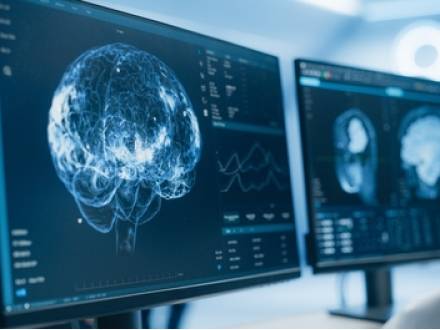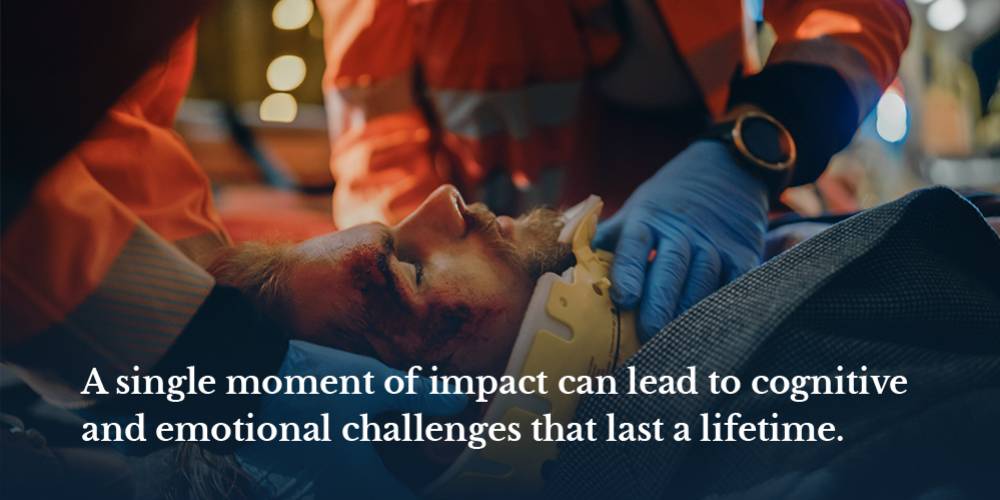Traumatic Brain Injuries After a Car Accident Can Change Your Life
 While a traumatic brain injury (TBI) can happen in seconds, the effects can last a lifetime. Following an Illinois car accident, head trauma victims may walk away believing they are "fine," only to begin experiencing headaches, memory problems, mood changes, or cognitive difficulties hours, days, or weeks later. TBIs are some of the most misunderstood – and most devastating – injuries caused by car collisions.
While a traumatic brain injury (TBI) can happen in seconds, the effects can last a lifetime. Following an Illinois car accident, head trauma victims may walk away believing they are "fine," only to begin experiencing headaches, memory problems, mood changes, or cognitive difficulties hours, days, or weeks later. TBIs are some of the most misunderstood – and most devastating – injuries caused by car collisions.
Because symptoms can be delayed or not visible, insurance companies may question the injuries or even argue that the crash was not the cause. TBIs impact the victim as well as his or her loved ones, and the consequences can last months, years, or forever. Many TBI victims struggle to return to work, maintain relationships, or simply handle day-to-day activities.
Since TBI injuries are often invisible, they can be misunderstood and not taken seriously, not only by the insurance company but also by employers, friends, and family members. Understanding the severity of a TBI is the first step in protecting your health and your right to compensation. Having a highly experienced Winnebago County, IL personal injury lawyer on your side can make a significant difference in the outcome of your case.
Understanding Traumatic Brain Injuries Following an Illinois Car Crash
A traumatic brain injury occurs when an external force disrupts the brain’s normal function. In an Illinois car accident, this can occur even when there is not a direct blow to the head. A concussion is the most common form of brain injury, occurring when the brain is "jostled" inside the skull, leading to chemical changes and temporary disruptions in brain function. Symptoms can include headaches, dizziness, confusion, memory issues, light sensitivity, or emotional changes that may appear hours or days later.
Diffuse Axonal Injury (DAI) is one of the most severe forms of brain injury, occurring when rotational forces stretch or shear the nerve fibers (axons) that transmit signals between brain cells. The victim of a DAI may appear "normal," but the internal damage to the brain can be severe. DAIs often lead to prolonged unconsciousness, long-term cognitive issues, or permanent disability.
A brain or cerebral contusion is a bruise on the brain caused by direct impact inside the skull. Contusions can lead to swelling, bleeding, and increased pressure in the brain. Symptoms of a cerebral contusion can include agitation, localized weakness, memory problems, and difficulty thinking.
A penetrating brain injury is less common in "normal" motor-vehicle crashes, but can occur when an object like shattered metal, glass, or debris breaks through the skull and damages brain tissue. Penetrating brain injuries are often life-threatening and require emergency surgery.
Can a Low-Speed Crash Cause a Traumatic Brain Injury?
Even a low-speed collision (10-15 mph or less) can generate enough force to injure the brain. TBIs are not equal to the vehicle damage; they are caused by how the brain moves inside the skull during acceleration, deceleration, or rotational motion. In a low-speed crash, the head can whip forward and backward violently, even when there is no direct blow to the skull.
When the head snaps forward, the brain lags behind, striking the inside of the skull, then snapping back and striking again. Rotational forces, even small twisting motions, can stretch and tear nerve fibers, leading to one of the most serious forms of TBI (diffuse axonal injury). Even a TBI that is not visible on a CT or MRI scan can be life-altering.
Why Are Traumatic Brain Injuries Often Missed or Misdiagnosed?
The symptoms of a TBI may not be immediately noticeable, and ERs generally focus on life-threatening injuries first. Initial imaging may appear normal, despite brain trauma. Many TBIs will require extensive neuropsychological testing to be definitively diagnosed. Victims of a TBI may minimize symptoms of a TBI or attribute them to the stress of the crash until those symptoms continue to persist or worsen. Common symptoms of a TBI that can be delayed include:
-
Headaches
-
Dizziness
-
Nausea
-
Vision issues
-
Sensitivity to light
-
Difficulty concentrating
-
Irritability
-
Sleep disturbances
-
Depression
-
Memory lapses
-
Mood swings
Unfortunately for TBI victims, delayed symptoms or a failure by the ER to immediately diagnose a brain injury can cause them significant problems later on when they attempt to collect damages from an insurance company.
What Common Long-Term Consequences of a TBI Can Alter a Victim’s Life?
There are many different long-term consequences related to TBI that can change lives forever. Some of these include:
Cognitive Impairments
The cognitive impairments associated with serious TBI injuries can include difficulty multitasking, constant "brain fog," and slowed thinking skills. These symptoms can have an adverse effect on the ability to function in daily tasks, as well as a negative impact on work performance and the ability to return to work.
Emotional and Behavioral Changes
Emotional changes associated with TBI can include sudden, intense mood swings, crying or laughing in times when such reactions are not appropriate, and becoming easily frustrated, annoyed, or angry. There is a high risk of experiencing depression, anxiety, and PTSD following a TBI, and some victims will exhibit apathy, or a "flat" mood with a lack of motivation or interest in activities. Behavioral changes can include impulsivity and poor judgment, saying or doing inappropriate things, trouble reading social cues, or engaging in restless, fidgeting, or repetitive movements. Verbal or physical outbursts are common as well.
Physical Limitations
There are many different physical results of a TBI, including difficulty with balance and coordination, weakness or paralysis in the arms or legs, muscle stiffness, trouble forming sentences, and slurred words. Blurred or double vision may occur, as well as hearing loss or ringing in the ears. Some TBI victims have an altered sense of smell or taste, persistent headaches, and excessive fatigue and lack of energy. In more serious cases, there can be difficulty swallowing or a loss of bowel or bladder control.
Financial and Lifestyle Impacts
Lost income from an inability to return to work, and costly medical treatments and therapies, which can last a lifetime, can quickly drain a family’s financial resources. Long-term care can be extremely expensive, leading to added strains on relationships and family dynamics.
What Compensation is Available for Long-Term TBI Car Accident Victims?
Victims of a car accident-related TBI can seek compensation for damages that include current and future medical expenses, physical therapy, occupational therapy, and cognitive rehabilitation. Lost wages and lost future earning capacity are compensable, as are pain and suffering damages. Pain and suffering can include actual physical pain as well as emotional distress and PTSD.
Loss of enjoyment of life can be compensable, as can a permanent disability. In severe TBI cases, long-term care of assisted living needs may be necessary and are compensable. Under the modified comparative negligence principle (735 ILCS 5/2-1116) in Illinois, the victim must not be more than 50 percent responsible for the accident that caused the brain injury.

Contact a Rockford, IL Traumatic Brain Injury Lawyer
Since an insurance company may attempt to dispute whether a TBI occurred, whether the crash caused the TBI, or whether symptoms are being exaggerated, it is essential to have a strong legal advocate by your side. A knowledgeable Winnebago County, IL personal injury attorney from Mannarino & Brasfield, A Division of Schwartz Jambois, will ensure that you receive full and fair compensation for your TBI injuries.
Our firm has secured millions of dollars in verdicts, including six and seven-figure settlements. We handle very serious and catastrophic personal injury and medical malpractice claims and will fight aggressively for our clients who have been injured as a result of someone else’s negligence. Call 815-215-7561 to schedule your free consultation.



